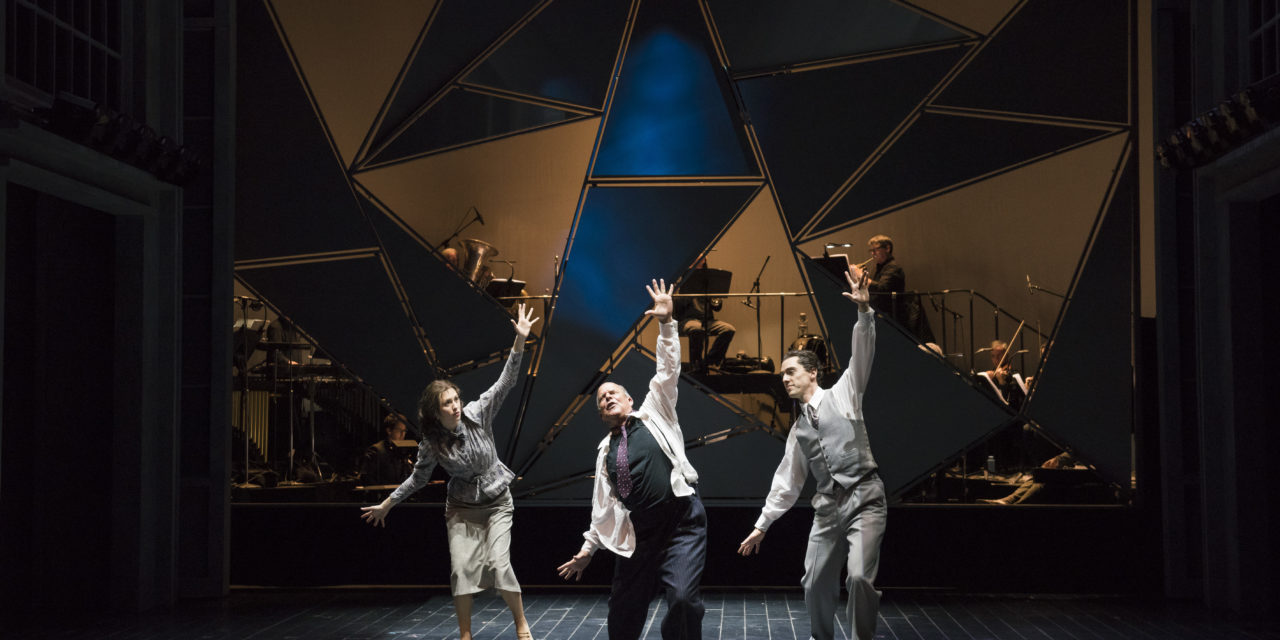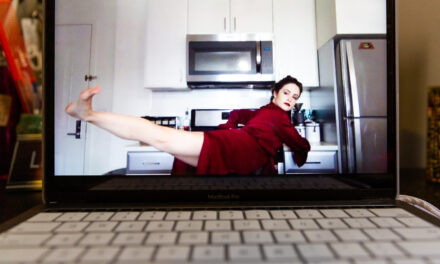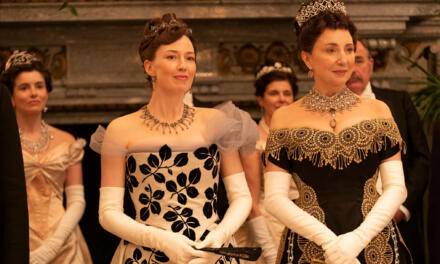It’s a bold move to write an opera about a musical genius: to evoke the style of said great composer without sounding derivative, to balance historical fact with creative storytelling. But Boston-based composer Tod Machover with librettist Simon Robson and director Karole Armitage accomplished all of the above in the Boston Lyric Opera-commissioned new opera Schoenberg In Hollywood, which celebrates the brilliance of 20th-century composer Arnold Schoenberg
Schoenberg In Hollywood pivots around Schoenberg’s historical 1935 meeting with the Hollywood producer Irving Thalberg, who offers Schoenberg the opportunity to partner with his studio and compose the soundtrack to his next film. Schoenberg, who was perhaps best known for his innovations in atonal music, had captured the attention and admiration of creatives all around the world. Ever proud and possessive of his compositions and his creative process, however, Schoenberg refuses to partner with Thalberg, scoffing at the idea that his music would have to be modified to fit the action of the film. Following his decision not to partner with Thalberg, Schoenberg reflects on his life and how he came to be in Los Angeles. Schoenberg’s history is then shown through a series of vignettes, with each pivotal moment in the composer’s life written as a different film genre, such as silent film to depict his childhood, film noir setting the scene for the discovery of his wife’s affair, and a Western for his move west from Austria to the United States.
While Schoenberg feared and rejected collaboration, the artistic team for Schoenberg In Hollywood fully and successfully embraced it. The largely monochromatic and physically imposing set (Simon Higlett) provided the visually-appealing backdrop for the films and animations being shown to support and enhance the action on stage. The projections and animations (Peter Torpey) were an incredible addition to the opera. In every scene, there was something new and exciting on the screen to evoke the setting and provide emotional context. Furthermore, portraying pivotal moments in Schoenberg’s life as different film genres was a very effective way of capturing the dramatic undercurrent of each life event, with the music of the opera serving as the soundtrack for the scene.
The character of Schoenberg was brilliantly portrayed by Omar Ebrahim, who was delectably able to maintain his characterization of the proud, intellectual composer in each different film genre and situation. His rich voice brought expression to each musical passage, hitting each dramatic moment and bringing to life a wonderfully complicated historical figure. Schoenberg was joined onstage by the Boy and the Girl, played by Jesse Darden and Sara Womble respectively, who likewise had beautiful voices, and played all of the other characters that Schoenberg encounters throughout his life.
Playing so many characters in one show is tricky, especially since the Boy and the Girl seemed to each follow a certain track: largely speaking, the Boy was playing male characters who admired Schoenberg as a composer, such as the Hollywood producer Thalberg and other composers who worked closely with Schoenberg (Webern, Berg, and Mahler). While the Girl, on the other hand, was playing female characters who were romantically or emotionally involved with Schoenberg, such as his two wives and mother. I found it difficult to differentiate between all of the characters as many of Darden and Womble’s physicalizations were very similar between their characters. The female characters seemed particularly indistinguishable, though, in many ways, this can be attributed to the writers who, being so focused on the development of Schoenberg, did not put much thought into what made the women in Schoenberg’s life unique or important as individuals. I felt that Schoenberg’s second wife, Gertrude was defined only by her loyalty, while his first wife, Mathilde, was defined solely by her infidelity. This is made particularly clear during Mathilde’s tragic demise when Schoenberg, thinking only of the pain her death will cause him, exclaims “Don’t change my world, Maltilde. Don’t die / Don’t leave me alone with Arnold Schoenberg” (Rogers, 2018).
While perhaps this selfish act was meant to be viewed as a fault of the great composer’s, since the opera serves largely to celebrate his superior genius, I feel that ultimately we are meant to view Mathilde as Schoenberg did: lewd and overly emotional. The portrayal of this contrast between male intellect and female sentimentality has unfortunately become an all too familiar concept to many women studying in the field of music. In an opera that was so conscious of modern day social issues of xenophobia and immigration, it was unfortunate to me that the traditional gender roles were not fully problematized.
Issues of gender aside, Schoenberg In Hollywood was very successful in its portrayal of a fascinating historical figure. The projections, libretto, design elements, and compellingly complex music did well to evoke Schoenberg’s past while staying true to his legacy and pushing the envelope on sound, harmony, and design. I look forward to future productions of this intriguing new work.
This post was written by the author in their personal capacity.The opinions expressed in this article are the author’s own and do not reflect the view of The Theatre Times, their staff or collaborators.
This post was written by Megan McCormick.
The views expressed here belong to the author and do not necessarily reflect our views and opinions.


















